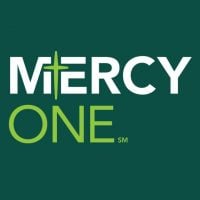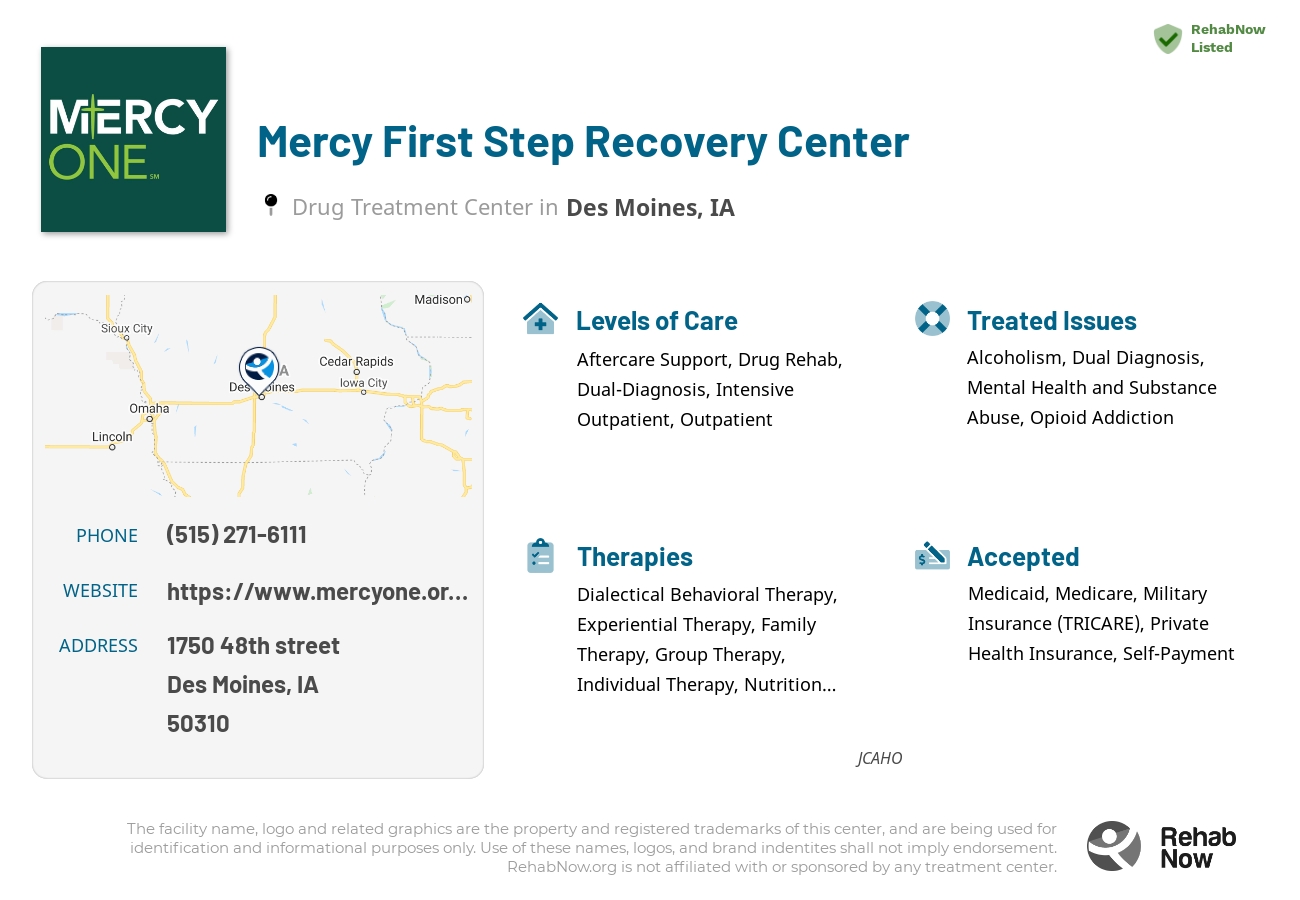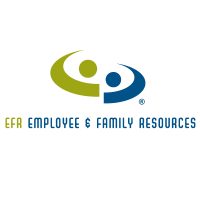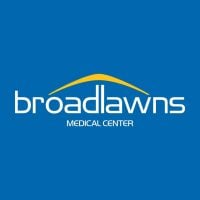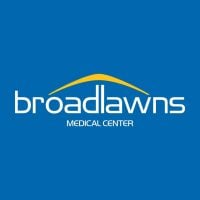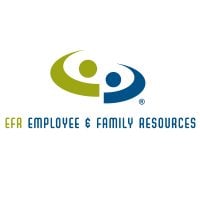Mercy First Step Recovery Center
Drug Rehab Center in Des Moines, Iowa
Mercy First Step Recovery Center is an addiction treatment facility located in Des Moines, IA, offering an array of evidence-based psychotherapies such as Cognitive Behavioral Therapy (CBT), Partial Hospitalization Program (PHP), and Intensive Outpatient Programs (IOP) to provide a personalized approach for those suffering from opioid addiction, substance abuse, alcoholism, dual diagnosis and mental health conditions.
About Mercy First Step Recovery Center in Iowa
Mercy First Step Recovery Center in Des Moines, Iowa, stands as a beacon for those striving to overcome addiction. Focusing on adolescents and adults, it offers intensive outpatient programs and aftercare support. Notably, the center caters to diverse groups through specialized programs, embracing a holistic approach to the mental and behavioral health of its clients.
- Diverse Specialization: Tailored programs for young adults, seniors, bilingual individuals, and those with co-occurring disorders enhance the center's inclusivity.
- Comprehensive Care: Offers an Intensive Outpatient Program (IOP) featuring personal care plans and a full spectrum of counseling services, grounded in evidence-based methodologies.
- Robust Aftercare: Continuous support through aftercare services, including 12-Step facilitation and peer coaching, ensures lasting recovery.
Accredited by The Joint Commission, Mercy First Step Recovery Center guarantees a high standard of care. Accepting a wide range of payment options from private to military insurance, and even accommodating those in need with financial aid, the facility removes barriers to access, making recovery possible for all.
Addressing opioid addiction, substance abuse, alcoholism, and dual diagnosis, the center uses a blend of drug rehab, medication-assisted treatment, and evidence-based therapy. By offering outpatient to partial-hospitalization programs, Mercy First Step meticulously matches treatment intensity to client needs, setting the stage for successful recovery.
Genders
Ages
Modality
Additional
Accreditations

JCAHO
Conditions and Issues Treated
Some addicts can benefit from substance abuse treatment, which is designed to help them become and remain sober without the use of medications. These programs are typically used by those struggling with drugs like marijuana or hallucinogens. However, they might be beneficial for those with a co-occurring mental health disorder like schizophrenia, major depression or bipolar disorder.
During this type of treatment, the addict will meet with therapists and other professionals on a regular basis to learn coping skills and healthy ways to deal with their addiction and mental health disorder.
Treatment programs often combine medications with counseling, support groups and even medical services like those found in hospitals or doctor’s offices. There are also detoxification services that addicts can use to get sober and avoid severe withdrawal symptoms.
Opioids are a group of drugs that include substances such as heroin, morphine, and oxycodone. These drugs activate opioid receptors in the brain, which produce pleasurable feelings. Opioid addiction occurs when drugs are abused at increasing rates or increasing amounts because the body becomes tolerant of them.
Opioid addiction is typically diagnosed when drug abuse becomes a typical behavior that interferes with an individual’s ability to function daily. The use of the substance results in consequences like legal problems.
Treatment for opioid addiction varies depending on each individual’s needs. Some treatments focus on replacing opioids with other drugs that have similar effects of reducing withdrawal symptoms. Other treatments aim to reduce the risk of relapse by providing psychological support or using more natural methods.
A drug rehab center that uses Dual Diagnosis is more likely to be successful in rehabilitating a person. Dual diagnosis helps to identify and treat any co-occurring disorders. It is essential to screen for both addiction and any untreated mental health issues. A dual diagnosis gives rehab the means to treat addiction while restoring mental and emotional health.
About 70% of patients with drug addiction have at least one other psychiatric diagnosis. Fortunately, dual diagnosis treatment is a proven model that has been highly effective.
Levels of Care Offered
This center offers a variety of custom treatment tailored to individual recovery. Currently available are Aftercare Support, Drug Rehab, Dual-Diagnosis, Intensive Outpatient, Outpatient, Partial-Hospitalization, with additional therapies available as listed below.
An intensive outpatient program is usually the first phase of addiction treatment. It provides relief for those addicted, but not ready to commit to an inpatient setting. IOPs consist of a daily 3 to 5-hour program, and there is a required number of hours per week. The goal here is to teach patients healthy coping skills, such as stress management.
Outpatient programs offer a lower intensity level of addiction treatment than inpatient facilities. They are ideal for those who have graduated from inpatient facilities, have a supportive home environment, and are motivated to commit to the program. Services offered include medication-assisted treatment, individual and group therapy, and peer group support.
This treatment is a popular option for those suffering from a lower intensity addiction. It is not advisable for someone who needs to go through a medically supervised detox or does not have a supportive home environment. It requires motivation and dedication to commit to the program without constant monitoring.
For people looking for drug treatment, partial hospitalization programs offer an alternate option to inpatient rehab or residential treatment. Patients attend therapy sessions for a set number of hours each day. They can typically visit family or go home during non-therapy hours.
Partial hospitalization programs can last from one to six months and are appropriate for patients with acute addiction symptoms. Mercy First Step Recovery Center offers a partial hospitalization program in , and is a good option for people looking for drug treatment.
Aftercare Support in drug rehab is crucial because it helps people stay sober after treatment. Aftercare Support in drug rehab is helpful because it provides the recovering person with a support group, including family members, friends, and other peers who are also in recovery.
The benefits of Aftercare Support are that it provides a pathway that will help people get sober for life. It supports healing at all levels, physical, mental, emotional, and spiritual. Another benefit of Aftercare Support is that participants learn to maintain their sobriety through holistic methods. They learn to modify behaviors individually to have peace of mind, have positive relationships with others, and find peace on the inside.
Therapies & Programs
During individual therapy at Mercy First Step Recovery Center in , the person in recovery meets with a therapist one on one to go over their situation and learn from past mistakes. The counselor or therapist will use this time to address the causes of addiction, triggers, and any mental issue or dual diagnosis. They will also address aftercare plans, giving them the best chances of long-term sobriety.
This therapeutic process is very intense and challenging to go through. Some clients may find it easier to open up with someone apart from their family or loved ones who understand their struggles and experience with addiction.
Family therapy is designed to help addicts get clean and sober by using what they love the most; their family. Most drug treatment centers make it mandatory that the addict’s family attend therapy sessions, which is great because having everyone there to support them makes it much easier for them to get clean. Not only are they surrounded by people who want them to get better, but everyone is there because they want the best for them, not because they feel like they have to be.
Drug addicts are often surrounded by resentful or uneducated family members who would, at times, rather see them stay addicted because it makes their own lives easier. Sometimes they don’t understand what the addiction is or how they play a part in it. They know that during and after the addict’s sobriety journey, they will face challenges and changes that they aren’t sure how to handle. This can be very tough for an addict to go through on their own, which is why it’s so important that they have the support of their family. Just because someone is an addict does not mean that they don’t deserve the love and support of those around them.
Addicts in Des Moines, IA can find support in group therapy at Mercy First Step Recovery Center by finding peers who understand their situation and being held accountable. They also learn to develop faith, understanding, and insight into their addiction through shared conversations.
Group Therapy is employed by drug treatment centers to provide the recovering addict with a platform to talk about their feelings and experiences. It also provides for an opportunity to learn from other addicts who have successfully overcome their addiction. It is recommended that all group members be recovering addicts for this type of therapy to work.
Trauma therapy allows people who struggled with a past trauma to face the situation and learn from it. Many people go through traumatic events at an early age that later leads them into addiction as adults. By addressing this issue during treatment at Mercy First Step Recovery Center in [/type], you can move forward with your recovery process and take back control of your sober future, too!
Traumas are one of the most common causes of psychological disorders such as Addiction Disorder. It’s often found among those diagnosed with Addictive Disorders because traumatized individuals have strong emotions or thoughts related to their traumas, leading to addictive behaviors.
Dialectical behavior therapy (DBT) is a cognitive-behavioral therapy that focuses on eliminating specific negative thoughts, such as suicidal thoughts. These negative thoughts can potentially lead to an individual inflicting self-harm. It helps treat patients exhibiting uncontrollable emotions, intense mood swings, and borderline personality disorders.
The term “Dialectic” means the integration of opposites. In substance abuse, DBT refers to accepting the patient’s addiction and working to change their thoughts and behavior. It improves life skills such as controlling intense emotions without reacting impulsively, resolving interpersonal conflicts effectively, and promoting awareness about self and others.
Cognitive Behavioral Therapy (CBT) helps addicts comprehend the causes of their substance abuse and the consequences that follow. The treatment’s goal is to help addicts gain self-control and maintain abstinence from drugs and alcohol over the long term. Through CBT, clients learn to recognize and avoid high-risk situations and cope with challenging situations when they arise.
Rational Emotive Behavior Therapy, or REBT, is a form of Cognitive Behavioral Therapy developed to help people overcome specific emotional and behavioral problems.The theory behind REBT is the belief that a person’s thinking (and resulting emotions) create their reality. By helping patients let go of certain ideas, they can reduce their feelings of anger and hostility and feel a sense of relief from rigid expectations. This, in turn, is believed to result in a reduction in both emotional and behavioral problems, impacting drug addiction.
In a 12-Step Program, peers help each other to achieve the goal of total sobriety. 12-Step Programs are available in almost every city in the United States. They’re a relatively simple set of steps that are done continuously to move through life with awareness, accountability, and honesty. The recovery technique used by Alcoholics Anonymous is the 12 step program, but it can relate to any form of addiction.
Nutrition therapy has been used as a treatment modality for addiction recovery and in eating disorders for adults, adolescents, and children. Specific nutrients have been identified that influence neurotransmitters associated with reward pathways of the brain. Carbohydrate loading with complex carbohydrates to elevate serotonin levels was effective in treating bulimia nervosa. This approach prompted researchers to explore the use of this type of nutritional intervention in other disorders.
Nicotine replacement therapy is a popular method of treatment that helps individuals overcome their addiction to cigarettes by providing them with safer alternatives. Nicotine replacement options can include:
- Inhalers
- Gum
- Patches
These treatments are often used in combination with other therapies, such as cognitive behavioral therapy or motivational interviewing, to help individuals more easily transition into a smoking-free lifestyle.
Contingency Management has been found to be effective in helping people with drug addiction problems or those who are struggling with other types of addiction. Contingency Management is an approach to treatment that applies behavioral psychology to achieve abstinence or improved health outcomes. One of the goals of Contingency Management is to encourage patients by providing incentives for not using drugs or engaging in other rewarding activities. Individuals who receive CM at Drug Treatment Centers have reportedly improved retention rates for substance abuse treatment.
Patient Experience
Experiential Therapy at Mercy First Step Recovery Center
Experiential therapy is a type of treatment involving immediate, intense experiences designed to manage addiction. Experiential therapy is beneficial for:
- People who are seeking to overcome an addiction but have difficulty focusing on treatment goals
- People with short attention spans due to high levels of stress or difficulty concentrating
- People who are afraid of engaging in treatment due to negative past experiences
Payment Options Accepted
For specific insurance or payment methods please contact us.
Is your insurance accepted?
Ask an expert, call (888) 674-0062
House of Mercy Associated Centers
Discover treatment facilities under the same provider.
- MercyOne Dubuque Medical Center in Dubuque, IA
- House of Mercy - Moines in Des Moines, IA
- House of Mercy - Newton in Newton, IA
- Mercy Medical Center - Des Moines in Des Moines, IA
- Mercy Behavioral Care in Sioux City, IA
Learn More About House of Mercy Centers
Additional Details
Specifics, location, and helpful extra information.
Des Moines, Iowa 50310 Phone Number(515) 271-6111 Meta DetailsUpdated April 15, 2024
Staff Verified
Mercy First Step Recovery Center Patient Reviews
There are no reviews yet. Be the first one to write one.
Des Moines, Iowa Addiction Information
Iowa ranks 2nd lowest in the nation for illicit drug use, but 12% of its residents are still using these drugs every single year. Methamphetamines account for more than 90% of all drug-related prison admissions in Iowa. Alcohol is the most widely abused substance in the state, with 23% of residents admitting to heavy drinking.
In Des Moines, the number of drug-related deaths has increased in recent years. In 2013, there were 31 drug-related deaths, which is up from 26 in 2012 and 23 in 2011. The majority of these deaths were caused by heroin or prescription opioids. Some of the most commonly abused drugs include marijuana, cocaine, heroin, and prescription opioids. If you or someone you know is struggling with addiction, please reach out for help.
Treatment in Nearby Cities
- Audubon, IA (65.0 mi.)
- Webster City, IA (59.8 mi.)
- Belle Plaine, IA (75.3 mi.)
- Decorah, IA (152.0 mi.)
- Keosauqua, IA (108.3 mi.)
Centers near Mercy First Step Recovery Center
The facility name, logo and brand are the property and registered trademarks of Mercy First Step Recovery Center, and are being used for identification and informational purposes only. Use of these names, logos and brands shall not imply endorsement. RehabNow.org is not affiliated with or sponsored by Mercy First Step Recovery Center.
